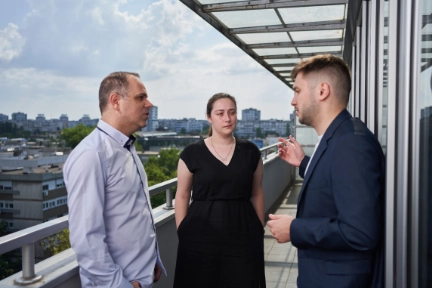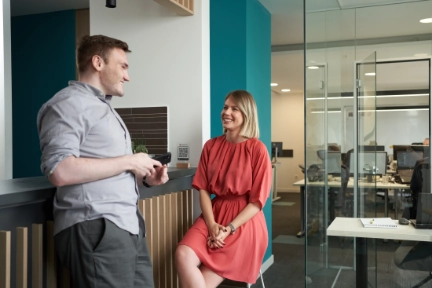Careers
“A breath-of-fresh-air” culture.
Selecting qualified, interesting and motivated employees, implementing planned mentoring and training programs, promoting logical reasoning, critical thinking, integrity and a friendly atmosphere shape the culture that enables accelerated professional and personal growth.
Making career plans has never been more difficult. Macroeconomic and political factors, the latest artifacts of exponential technologies and many other disruptors are constantly shifting the global business landscape, and with it, the job market, in unpredictable ways.
As a company, we pledge to our employees to make reasonable efforts to provide them with opportunities for sustainable professional and personal development as we courageously face the winds of change together.
Systematically broadening the range of employee capabilities
Being a specialist in a particular field is valuable. However, we believe that acquiring generalist skills will be very useful, if not necessary, in the near future. For example, being a SW engineer is quite different from being a coder. Being a digital marketer is not the same as being a Google SEO specialist. Working in customer service does not mean being the chatbot for the customers…
To achieve this, our talent operations rely primarily on the following practices:
Applied together, these three practices allow for a systematic expansion of skills within a given field and beyond.
Creating an environment that protects the quality of life
There can be no balance between work and life. Work is an important part of our lives, not its competitor. Consequently, quality of life also depends on the quality of time spent at work. Being understood and valued. Feeling safe and supported. Having space to fail and try again. Developing one’s individuality while being part of a community. To preserve and promote all this is indeed our most important mission.
Inspiring individuals acting as a strong team
Amidst the digital age of marvels and AI, the beating heart of our company remains our people. With their boundless creativity and tireless drive, they are our greatest asset in the ongoing quest for success.














































Let’s talk about what we can do together
Take a look at the list of current vacancies and contact us if you need further information or support.
Senior software engineer – PHP
Your PHP expertise needed to fuel our technical advancement and growth.
View detailsSenior software engineer – .NET
Put your .NET skills to work, driving development and innovation in our team.
View detailsFor general inquiries related to talent operations please contact us at: job@logeecom.com
FAQ
In our FAQ section, we strive to provide answers to some of the most common and interesting questions that may be relevant to the visitors of this site. Our ambition to eliminate (or at least reduce) pollution from information overload is our guiding principle for online and offline communication and is scrupulously adhered to in this area as well.
What is the typical hiring process for software engineering positions in your company, and what can applicants expect at each stage?
The hiring procedure depends on the seniority of the engineering position.
For senior positions:
After receiving applications, we will conduct an initial candidate selection and invite the chosen ones for a short (half-hour) online interview to briefly introduce themselves and determine the existence of mutual compatibility. Following this, the selected candidates will be invited to a technical interview where they will have the opportunity to present their previous work, their way of thinking about key topics and specific knowledge related to the advertised position. Additionally, the candidate will have the chance to familiarize themselves with the standards, practices and processes applied in our company, as well as additional details related to the position. The final interview involves an open conversation aimed at better mutual acquaintance and a possible engagement offer. We commit to providing relevant feedback to all interviewed applicants, regardless of the stage of the selection process they reached (i.e., whether they are invited to the next round or rejected).
For junior positions:
After receiving applications, we will conduct an initial candidate selection and invite the chosen ones for testing. Other candidates will be promptly informed about the results of the first round of selection. Testing involves checking theoretical knowledge and solving problems of varying complexity. All tested participants will have the opportunity to learn their test results with a detailed explanation and any potential recommendations from our leading engineers based on the test results. Candidates who are successful in the testing will be invited to a final interview, which includes a brief review of the test results, an open conversation aimed at better mutual acquaintance and a possible engagement offer from Logeecom.
What types of software projects does Logeecom specialize in?
Logeecom thrives on a wide range of software projects across numerous fields and domains. We strive to not only implement software solutions but to actively participate in addressing the business challenges that our clients face. We welcome projects where clients present us with complex issues without obvious solutions. This allows us to leverage creativity and problem-solving skills, tailoring an optimal solution to the unique situation. Process-wise, first, we engage in in-depth discussions with the client to understand the problem, followed by researching existing solutions and learning about the domain. Subsequently, we draft a preliminary solution that encompasses aspects of the proposed software system’s behavior, architecture, potential technological considerations and a roughly estimated range of development timelines. After the initial stages, our focus shifts toward a more detailed elaboration of user requirements, which are formalized in a requirement specification document, the final refinement of the software solution’s architecture, implementation, verification and delivery.
It’s important to note that our project phases often overlap and build on one another in an iterative manner rather than proceeding in a linear, waterfall-style sequence. While one part of the system is being specified, another might be under development, and another under verification. This cyclical, adaptive approach allows for increased efficiency and flexibility throughout the project lifecycle.
Are there any types of software projects that your company chooses not to undertake?
While we work across a wide spectrum of projects, we do exercise discernment in the projects we undertake. We believe that a thorough understanding of the project’s purpose is pivotal for successful delivery, therefore, we avoid engagements where we cannot fully comprehend their goal or the domain they operate in.
Furthermore, in adherence to our ethical and corporate social responsibility principles, we do not involve ourselves in projects that may promote harm, exploit vulnerabilities, or encourage addictive behaviors. We firmly believe in creating software that contributes positively to society and supports the well-being of individuals. Consequently, any projects that could potentially compromise these values are not within our area of interest.
How are teams organized?
Organizing effective engineering teams is a complex, multidimensional task that requires balancing numerous conflicting demands. At its core, this challenge involves the need to support individual growth while ensuring the delivery of high-quality performance. Engineers must have an in-depth understanding of the projects and technologies they’re working on while also being expected to continually learn new things and solve novel problems.
Additionally, it’s important for engineers to feel secure in a stable team environment, but simultaneously, stepping out of their comfort zone to work with new clients and colleagues can be crucial for their professional development. Moreover, there is an individual need to share knowledge with other peers but also to learn from more experienced colleagues.
Finally, engineers usually want to work on clearly defined tasks, but we also know that the key to individual growth lies in handling complex challenges that must not be described as a linear Jira item.
Balancing these contradicting forces is not an easy task. Our current organizational structure addresses it in a way where engineering teams are oriented toward handling multiple projects/clients. Engineers in the team have comprehensive responsibility for multiple project and engineering aspects, preferably working on wholesome features. At the top of each team is a project leader, whose delicate task, among others, is to recognize the dynamics of the project and individual team members’ needs; followed by striking a balance that maximizes both individual growth and project success.
Can you describe the atmosphere in the Company?
We fundamentally believe that the work we do forms an integral and significant part of our lives. With this shared understanding, we carefully select our coworkers and partners to foster an atmosphere that supports work in the areas of interest, where individuals feel fulfilled by tackling complexity and providing comprehensive solutions and where the environment supports one in their daily routine, but especially when stretched beyond their limits on their way of individual growth.
We also appreciate a beer after a hard day’s work.
We respect each other’s boundaries, and although close connections inevitably form, we are colleagues first and not a family.
What can new team members expect during their initial days at your company?
Transitioning into a new job or embarking on a career path is a mixture of exhilaration and nervousness. In our company, we address this by assigning a mentor to every new colleague from their first day. This mentor’s job is not only to provide training but to also act as a steadfast support system, assisting the newcomer in adapting to their role and the company’s culture.
Training for new hires is practical and tailored, corresponding to their previous experience. If you’re an industry veteran, we’ll guide you through our unique company processes, reference architectures and standards, as well as the specifics of the domains and initial projects you’ll be tackling. For engineers at the outset of their careers, we provide an extended, comprehensive training program spanning several months, bridging the gap between university education and the practicalities of real-world software engineering.
In the end, all team members take an active role in welcoming new additions, helping them integrate smoothly into the team and facilitating their growth. Through this collective effort, we ensure that every new colleague feels supported, confident and prepared to contribute to our company’s mission from their first day.
How do you integrate LLM tools into your daily routine?
Large Language Models (LLMs) are invaluable in our daily operations, bolstering our software engineering processes, especially in these two fields:
- As a tool, LLMs provide support across a significant portion of our software engineering lifecycle. They come in handy during requirements engineering, helping us define and manage requirements with improved precision. In the implementation phase, LLMs assist in writing code — particularly when we have a clear understanding of the objective. During testing, LLMs contribute to the generation of comprehensive test cases and expedite the detection of defects.
- Beyond their function as tools, we strive to actively integrate LLMs into the operation of the software solutions we create. This allows us to utilize the unique capabilities of LLMs, embedding advanced functionalities into our software and ensuring we deliver cutting-edge solutions to our clients.